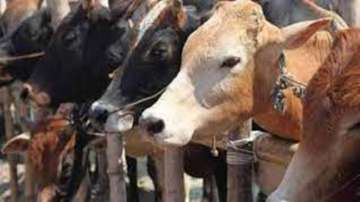The Assam government seeks to ban cattle slaughter and sale of beef in parts of the state where Hindus, Jains and Sikhs are in a majority.
In this effect, the Himanta Biswa Sarma-led government has tabled a bill in the Assam Assembly which also makes transportation of cattle from one district to another and outside Assam illegal in the absence of proper documentation.
Offences under the new proposed law - Assam Cattle Preservation Bill 2021 - will be non-bailable.
Sarma, after introducing the bill, said the "new legislation seeks to ensure that permission for slaughter wasn't granted in areas that are predominantly inhabited by Hindu, Jain, Sikh and other non-beef-eating communities or places that fall within five-kilometre radius of a temple, satra, and any other institution as maybe prescribed by the authorities".
Exemptions might be granted for certain religious occasions, he said.
The chief minister further said that there was an imperative need to enact a new legislation and repeal the earlier Assam Cattle Preservation Act, 1950 which lacked sufficient legal provisions to regulate the slaughter consumption and transportation of cattle in the state.
The law, when enacted, will further prohibit a person from slaughtering cattle unless he has obtained the necessary certificate issued by the registered veterinary officer of a particular area.
According to the bill, the veterinary officer will issue a certificate only if he is of the opinion that the bovine, not being a cow, is over 14 years of age.
A cow, heifer or calf may be slaughtered only it is permanently incapacitated, it said. Also, duly licensed or recognised slaughter houses will be allowed to butcher cattle, the bill maintained.
There will, however, be no restriction on ferrying cattle for agricultural purposes within a district. One does not need to take permission for transporting cattle to and from registered animal markets for the purpose of sale and purchase within a district.
Anybody found guilty of violating the law shall be punishable with imprisonment for a term which shall not be less than three years or fine that may vary between Rs 3 lakh and Rs five lakh or both. If someone convicted under the new law is found guilty of the same or a related offence the second time, the punishment will be doubled.
The legislation shall extend to the whole of the state and the term 'cattle' shall apply to bulls, bullocks, cows, heifer, calves, male and female buffaloes and buffalo calves.
With PTI inputs
Latest India News
